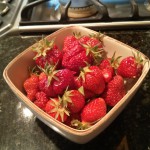 The strawberries are great this year. My patch is lush and green . . . and crowded with berries. Berries that drip sweet juice down your chin when you bite into them; the kind that stain your fingers red. Berries that entice me outside early in morning, while I’m still in my housecoat, to pick for breakfast.
The strawberries are great this year. My patch is lush and green . . . and crowded with berries. Berries that drip sweet juice down your chin when you bite into them; the kind that stain your fingers red. Berries that entice me outside early in morning, while I’m still in my housecoat, to pick for breakfast.
“You must be very proud,” my neighbor called over the fence one morning last week when she saw me bent over the patch.
Her comment made me uncomfortable (and that morning I was dressed so it wasn’t my clothing that made me squirm). It was the word pride. It gets me every time.
Inevitably when I have a book published, someone will say the same thing: ‘you must be very proud.’ And inevitably I cringe.
Pride, according to Oxford, is a feeling of pleasure from one’s own achievements.
I get a lot of pleasure from the strawberries in the garden, from my garden itself. I get a huge amount of pleasure from the books and articles I write too. I’m totally on board with pleasure.
But pride in my own achievements? That sounds a lot like taking ownership. And there’s the catch. In my heart of hearts I truly don’t believe I do anything creative on my own. I can’t will those strawberries into form or make the peonies bloom (though I can and did rescue a pile of long-neglected peony plants and I babied them for a long time before they bloomed again). So I can plant and dig and weed and hope, but something larger than me is in control.
For me it’s the same with writing. I can plot story landscapes and string words together; I can revise and polish, and polish some more. But there’s something much larger than me at play in the creation of a story. I’m not talking about all the people I depend on for help along the way, although those critique partners and editors, cover designers and marketers play a vital role as well. I’m talking about that unseen something many of us creative types tap into when we sit down to work. Call it the Muse or your Inner Voice or the Girls in the Basement. Call it the Kid Who Refuses to Grow Up. Whatever. All I know is that it exists, and it exists independent of me. On a good day, I touch it. On a great day, I’m part of it.
And whether I’m growing strawberries, babying peonies or writing books that makes me feel humble rather than proud.


I think you can have both the “p” words – pleasure and pride. Pride doesn’t have to mean boastful or lording it over others, but I think it can (should) be just a reflection of a genuine sense of accomplishment, of happiness with an outcome that you had a hand in. And you definitely had a hand (and much more) in the strawberry growth, the peonies . . . and your writing.
You’re right, Leigh, and I know it logically. But . . . I don’t know . . . from a gut level the word pride just feels odd. I sometimes wonder if there’s some kind of deeply buried ‘pride goeth before a fall’ memory I’m suppressing. Maybe my mother whispered it over my crib or something. ;>)